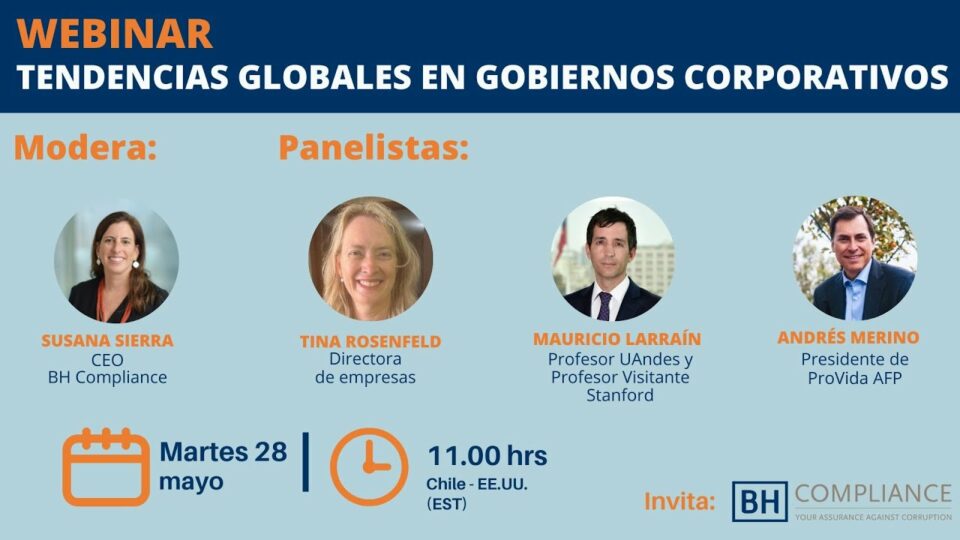
On Tuesday, May 28, BH Compliance held the webinar “Global Trends in Corporate Governance” in order to explain the challenge for companies to keep up to date and better address the changes that are affecting the world and impacting corporate governance.
For this, there was an interesting panel composed of Tina Rosenfeld, Director of Empresas; Andrés Merino, President of ProVida AFP; Mauricio Larraín, Professor UAndes and Visiting Professor at Stanford.
The webinar was moderated by Susana Sierra, CEO of BH Compliance, who pointed out that today there are several issues affecting corporate governance that go beyond the board of directors and involve all companies, including stakeholders, investor relations, crisis management, anti-corruption and probity policies, compensation and remuneration, among others. He also said that the world is moving very fast and, for example, in Europe new regulations are coming out that not only affect European companies, but also their suppliers, and therefore all companies must be aware of these requirements.
The event was opened by Mauricio Larraín, who is also a former commissioner of the Financial Market Commission (CMF), who referred to climate, social and technological changes and geopolitical conflicts as the main disruptions that are causing boards of directors to adapt and seek new responses. In this regard, he stressed the importance of managing these changes, identifying opportunities and taking advantage of them, with diversity being one of the important trends that corporate governance must consider in order to give greater value to the organization.
Tina Rosenfeld, for her part, commented on her experience as a company director, pointing out that she is called upon to manage change in order to be part of a board of directors, and to channel these changes so that they are carried out harmoniously between the management and executive teams, complementing their work for a common objective. He also emphasized the importance of approaching changes in sustainability from the objectives of the directors so that the changes start from the top.
Andrés Merino gave a view from the point of view of institutional investors, and the importance of ESG in our country today, since good corporate practices not only improve investment, but also allow companies to become more complete, worrying not only about risk-return in the investment evaluation, but also adding environmental, social and governance actions to it.
In this context, he commented on the need for an organizational design that is concerned with generating a cultural change.
The conversation left interesting conclusions regarding good governance practices such as the importance of diversity, self-evaluation and self-regulation.
Finally, each panelist referred to what companies should do to achieve good governance in the next 5 years.
Mauricio Larraín pointed out that it is important for the board to understand how climate, social, technological and geopolitical changes are taking place, and for boards to understand the revolution that is taking place in these issues and see how they can impact the organization, and “analyze how to adapt to this new reality, using concrete metrics,” he emphasized.
Andrés Merino said that it is essential for companies at all levels to have an organizational design and corporate structure, with people dedicated to sustainability, ESG, cultural diversity, women’s talent, etc., otherwise it will not work, because the day-to-day consumes general managers.
He also stressed the importance of the role of the chairman of the board of directors, who attends quarterly, and they are exposed to how good corporate practices are working. “Design incentives, because there is the what and the how, beyond the metrics,” she said, and that it be evaluated externally.
Tina Rosenfeld said that the most important thing to achieve these changes in governance is to strategically evaluate the industry where they operate, where they are, where they want to be and how they got from today to the future. And benchmarks can help in this strategic plan, which show you “where you want to be and where it doesn’t make sense, because strategy is also making decisions about where I am not going to be,” she said.










